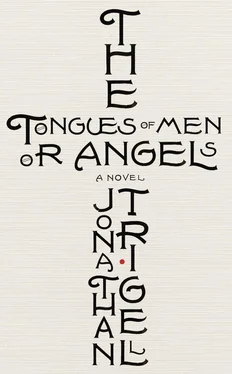The room was full of unease and tension. For all of them knew some of what might come to pass that night and even the best would be a terrifying ordeal and the worst would be unthinkable.
Yeshua and his beloved shared not only this fearful future but also their past. And they whispered together a lot during the meal. Of revelation, perhaps, or of love. No one but them knew. And why should they? Even a king must have secrets. Especially a king. And the one he loves should be the one to share them.
Among the Greeks, it was considered quite commonplace and natural for a man to love another man. For them to lounge together and feed each other. For them to take solace and comfort from the other’s touch. It was not so normal in Judaea. But, then, Yeshua was hardly a normal man and, anyway, he was from Galilee. But even enquiries into inclination are perhaps irrelevant for those who are celibate. And both Yeshua and the disciple he loved were. The other apostles all knew that Yeshua, who loved many, still loved one particularly. And that this man, quite naturally, loved Yeshua back. Quite naturally not only because everyone loved Yeshua — Yeshua was a prince — but because they were brothers: raised and grown together; born and bonded. Yeshua and James the Lesser loved each other as demonstrably and affectionately as any chaste men could. Just as King David loved Jonathan, so King Yeshua loved James. They loved each other only beneath their love for their land and their God.

When the meal was over. When all that needed to be said had been said. When Yeshua had washed his disciples’ feet, the king as their servant. When all had embraced and looked their friends in the eyes for the last time in the world as it was. Then Yeshua told the Twelve to arm themselves. And they picked up their swords and followed him out into the night.
Thirty-four Years after the Crucifixion
Useful examines himself in the burnished bronze disc; he has never really seen his own image before. Only in still pools and polished platters. His master didn’t have a mirror disc and, of course, no one else in the household could afford one. This is a world with little by way of reflection. People see themselves predominantly in the eyes of others. Perhaps that is why so much of a man’s life is tied up with notions of honour that depend not on what he thinks of himself but on what others think of him. Is this why Paul is so enthused about dictating the events of his life to Useful? Does he mean to have the world reflect back to him the view that he wishes to see?
The view Useful sees in the metal mirror is not of great comfort: a face bland as goose fat and not nearly as appetizing. It is easy to understand how little interest Useful has ever been able to summon from other people. Even so, the reflection he sees is not unadulterated: it is stretched and indistinct, tinged with bronze. Useful is not really seeing himself as others would see him.
And this distorted view, Paul says, is how we look at the whole world for now: basic and vague. He tells Useful that they will only see clearly when the Epiphany comes, but that day is expected to arrive at any moment: Paul is quite certain that this is the end time, that some of those who are now alive will meet with the Christ, soon to be returned to earth. Until that Day of the Lord, everything will remain blurred and incomplete, like staring into this metal mirror.
‘We should continue,’ Paul says. ‘Who knows how long we have?’
Useful carefully puts down the looking disc and returns to his scroll of parchment. He practised a little on pottery shards first, to be sure he had his hand, parchment being of such cost. The summer stink — the Tiber, night-filth and fish — seems to disappear when Paul talks. He has such vigour and such infectious conviction — born of an unbreakable sense of his own inner divinity — that you would need to doubt your own senses to doubt the truth of his beliefs. What it is to be with Paul in these last days. And to think that Useful, a slave, has been chosen to record this story.
‘Where had I got to?’
‘You had just told me about the stoning of Stephen, over which you approved,’ Useful says.
‘Ah, yes, Stephen. Poor Stephen. But fear not for him, boy, he will be among the beloved, resurrected when Christ returns to rule on earth. Stephen was given decent burial by certain devout men, they made great lamentation for him, and he will be among the first brought back to life.’
Paul eases himself down into the chair. The Romans have ‘chairs’. They are quite the thing: cross-strutted, canvas seat hanging between wood like a hammock. It is a marvel to be in this house at all, Useful thinks. But to be with Paul …
‘Back then,’ Paul continues, ‘the supporters of Jesus who were left were called followers of The Way, but they hadn’t really realized His significance, strange as that may seem to you now. It was only to me that it was revealed that the Christ was a part of God, an eternal being. But, anyway, that all comes later. Back then I was ravaging The Way wherever I could — entering meeting houses with the Temple Guards, dragging off both men and women to be beaten or whipped. The high priest Annas sanctioned all this. He was well pleased with the stoning of Stephen. He was scared of The Way, because its followers continued to grow in numbers and knew of his part in the death of Jesus. Annas probably feared a Sicarii dagger would one day find its way into his kidney. But he would have been against them anyway, because they held all their goods in common, they were the enemies of wealth and preached against the sort of privilege that Annas and his family enjoyed. And they still railed against Rome as well. Those who actually knew Jesus in his lifetime never understood Him as I do.
‘There was a big man in my troop who did my bidding: Korach. He was perhaps a little in awe of me — I was quite a sight, back then, in my prime. Though, of course, misdirected, until I was chosen by God. When we were interrogating those of The Way, I would always have Korach start with blows to the face. Once the face is all swollen and bruised the rest becomes easier. You make a beast of them first. Mess the captive up so that they no longer resemble a son of man. Then you can do what you want to the creature you’ve made. We gave many of them the forty lashes minus one. It’s no small thing, that punishment. Maybe you’ve seen it.’
Useful shakes his head.
‘I’ve received it on five occasions myself. Thirty-nine lashes, even with supple thongs and a fair hand, is agonizing and debilitating. You sleep on your chest for a month, when you can sleep at all. But upon the weak, with a whip stiff and weighted and a man the size of Korach swinging with full force from the shoulder and the knee, the forty-lashes-but-one can be a death sentence. One of the Nazarenes died before us, there at the holding post, hints of spine visible through his skin. It is not impossible that others succumbed from their wounds or infection after release.
‘But in my delusion, I believed that what we were doing was commendable, that’s what you must understand. Judaea held on to the last of self-rule and its religious rights by a babe’s grasp. The Romans had confiscated the high priest’s vestments and released them only by permission for the festivals. And worse: they chose and deposed the high priests. Pompey’s slatted boots had marched into the forbidden Holy of Holies, desecrating the place of God. Judaea’s ruling class lived in fear of orders to place statues of the emperor in Jerusalem, or even in the Temple, which would certainly have seen a rising of the people in rebellion and consequent war. Yet followers of The Way preached against Rome, threatening dissent and destruction. Those fools in the Jerusalem gathering, those so-called “Superlative Apostles” still threaten it, in fact: James and Jochanan and Cephas. They still can’t see that the Christ’s resurrection changed everything, that this is bigger than one land or one people. I learned a lot about The Way from those we interrogated, but it was from God that I received my true instruction.
Читать дальше













